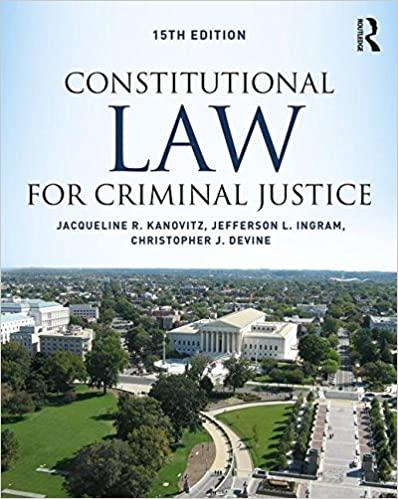Question
67. Which of the following is an emerging legal category of worker? a. equity employee b. dependent contractor c. distinct contractor d. independent employee 68.
67. Which of the following is an emerging legal category of worker?
a. equity employee
b. dependent contractor
c. distinct contractor
d. independent employee
68. Which of the following might an employer have relied upon in its successful bid to convince a
human rights commission that it would incur "undue hardship"?
a. evidence that the employer would have to modify its workplace rules
b. evidence that it was acting in good faith
c. evidence that accommodation will require an outlay of cash
d. evidence that accommodation will pose a health and safety risk
72. Which of the following is NOT typically addressed in employment standards legislation?
a. hours of work and overtime
b. minimum wage
c. the right to safe working conditions
d. termination and severance
75. Which statement best describes random drug and alcohol testing in the workplace?
a. Employers may conduct random drug and alcohol test at any time.
b. It is permitted only if the employer can prove both a dangerous workplace and an enhanced
risk.
c. Employers may conduct random drug and alcohol test in any industrial setting.
d. It is not permitted under any circumstances.
80. Which of the following is an implied term in an employment contract?
a. The employer may only terminate for just cause.
b. The employer may terminate the employment upon giving reasonable notice.
c. Notice must be given upon termination, regardless of just cause.
d. The employer is not required to give notice upon termination.
83. The defendant's counsel argued his client's termination of the plaintiff's employment without
notice after one incident of incompetence was justified. The court ruled in favour of the
defendant. Which statement would most strongly support the trial judge's decision in these
circumstances?
a. The conduct is prejudicial to the employer's business.
b. The employee falsely claimed to possess the requisite skills.
c. The conduct was incompatible with the employer's business.
d. The employee's conduct placed him in a conflict of interest.
84. Which term refers to an employee's deliberate failure to carry out lawful and reasonable orders?
a. willful insolence
b. insubordinate conduct
c. willful disobedience
d. incompatible conduct
Step by Step Solution
There are 3 Steps involved in it
Step: 1

Get Instant Access to Expert-Tailored Solutions
See step-by-step solutions with expert insights and AI powered tools for academic success
Step: 2

Step: 3

Ace Your Homework with AI
Get the answers you need in no time with our AI-driven, step-by-step assistance
Get Started


